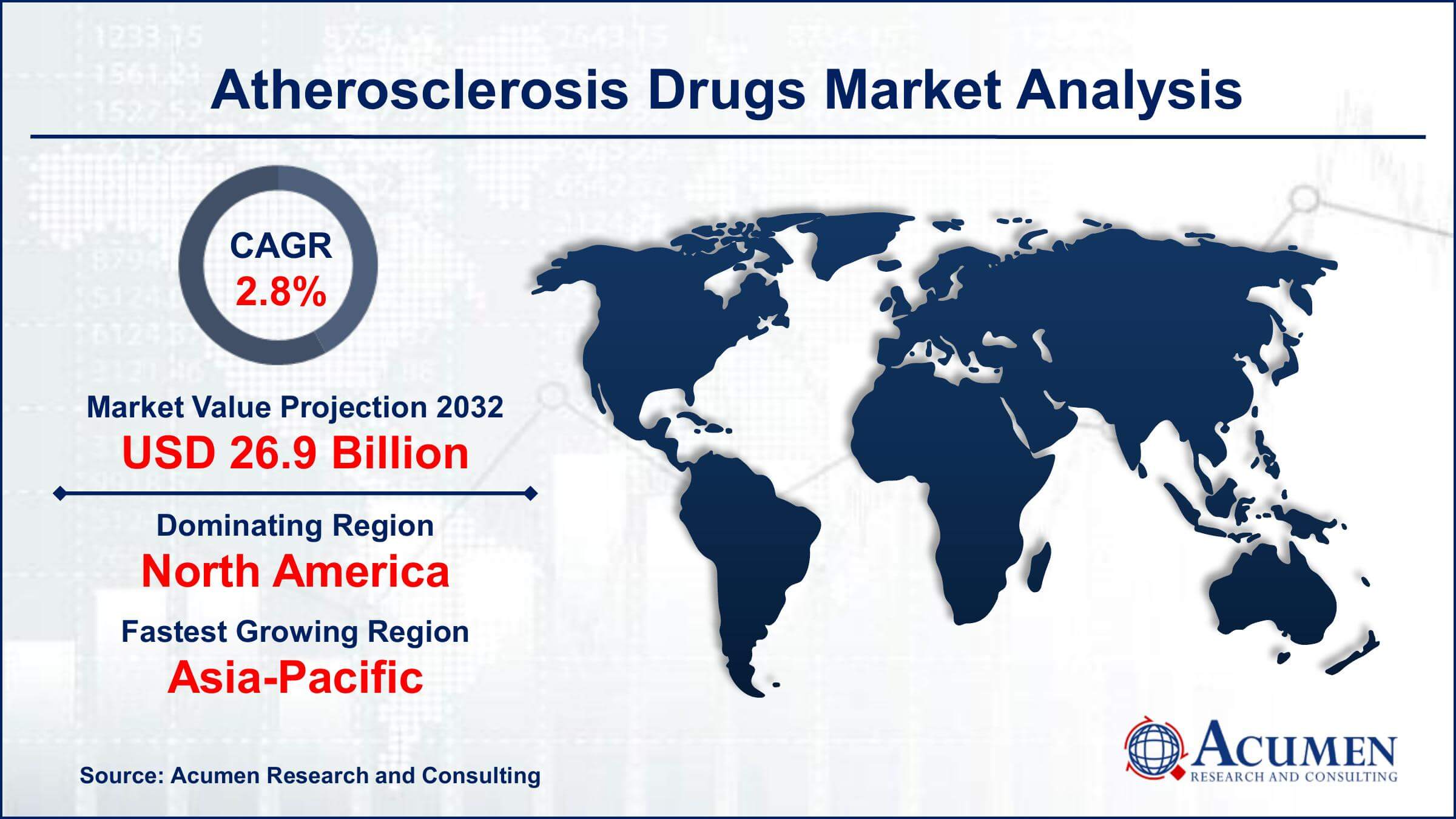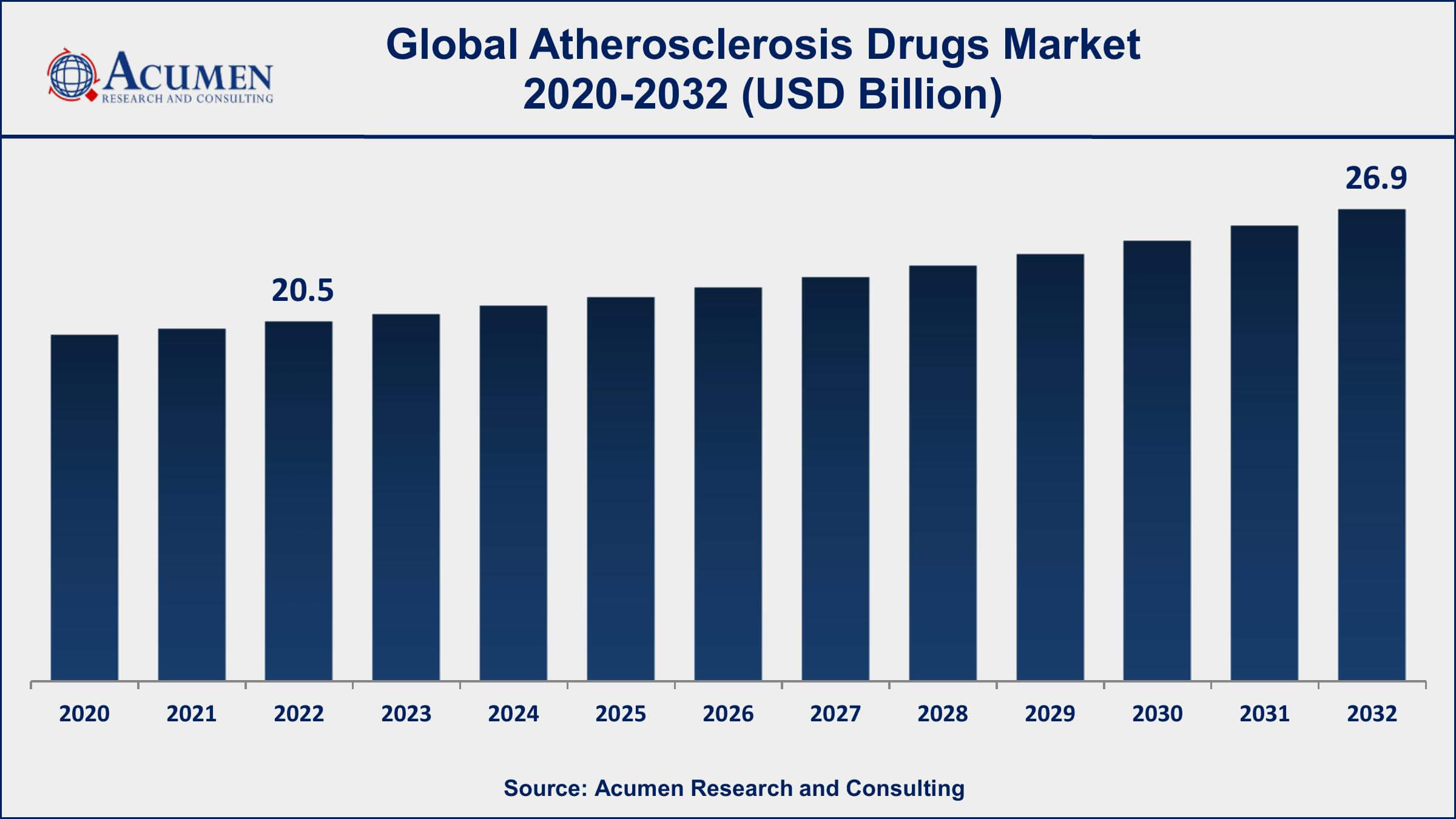Atherosclerosis Drugs Market Size - Global Industry, Share, Analysis, Trends and Forecast 2023 - 2032
Published :
Report ID:
Pages :
Format :
Atherosclerosis Drugs Market Size - Global Industry, Share, Analysis, Trends and Forecast 2023 - 2032
Report Coverage
- Industry Dynamics
- Market Size and Forecast Data
- Segment Analysis
- Competitive Landscape
- Regional Analysis with a Niche Focus on Country-Level Data
- High Level Analysis - Porter's, PESTEL, Value Chain, etc.
- Company Profiles of Key Players
- Option to Customize the Report As Per Your Specific Need
Request Sample Report
The Global Atherosclerosis Drugs Market Size accounted for USD 20.5 Billion in 2022 and is projected to achieve a market size of USD 26.9 Billion by 2032 growing at a CAGR of 2.8% from 2023 to 2032.
Atherosclerosis Drugs Market Highlights
- Global Atherosclerosis Drugs Market revenue is expected to increase by USD 26.9 Billion by 2032, with a 2.8% CAGR from 2023 to 2032
- North America region led with more than 41% of Atherosclerosis Drugs Market share in 2022
- Asia-Pacific Atherosclerosis Drugs Market growth will record a CAGR of around 3.9% from 2023 to 2032
- According to WHO 2022 report, raised cholesterol is projected to cause 2.6 million deaths and 29.7 million Disability-adjusted life years
- By drug class, the anti-platelet medications is one of the largest and fastest-growing segments of the atherosclerosis drugs industry
- Increasing prevalence of cardiovascular diseases, drives the Atherosclerosis Drugs Market value

Atherosclerosis drugs are a class of medications designed to treat atherosclerosis, a chronic vascular disease characterized by the buildup of plaque in arteries. Plaque consists of fatty deposits, cholesterol, calcium, and other substances, and it can narrow and harden arteries over time, reducing blood flow. Atherosclerosis is a major risk factor for cardiovascular diseases, including heart attacks and strokes. Atherosclerosis drugs aim to slow the progression of plaque formation, reduce inflammation, lower cholesterol levels, and manage other risk factors associated with the disease.
The market for atherosclerosis drugs has seen significant growth over the years due to the rising prevalence of cardiovascular diseases globally. Factors such as an aging population, unhealthy lifestyles, and an increase in risk factors like obesity and diabetes have contributed to the increasing incidence of atherosclerosis. As a result, pharmaceutical companies have been developing and marketing new drugs to address various aspects of atherosclerosis management. These drugs can include statins, antiplatelet agents, anticoagulants, and newer biologic therapies. Additionally, advancements in research and development, along with growing awareness of cardiovascular health, have driven market expansion. The market for atherosclerosis drugs is expected to continue growing as healthcare systems worldwide emphasize preventive measures and better management of cardiovascular diseases.

Global Atherosclerosis Drugs Market Trends
Market Drivers
- Increasing prevalence of cardiovascular diseases
- Growing aging population
- Sedentary lifestyles and unhealthy dietary habits
- Advancements in drug development and therapies
- Emphasis on preventive healthcare
- Rising awareness about cardiovascular risk factors
Market Restraints
- Patent expirations and generic competition
- High cost of innovative therapies
- Adverse side effects of some drugs
Market Opportunities
- Personalized medicine and targeted therapies
- Novel drug delivery systems
- Telemedicine and remote monitoring solutions
Atherosclerosis Drugs Market Report Coverage
| Market | Atherosclerosis Drugs Market |
| Atherosclerosis Drugs Market Size 2022 | USD 20.5 Billion |
| Atherosclerosis Drugs Market Forecast 2032 | USD 26.9 Billion |
| Atherosclerosis Drugs Market CAGR During 2023 - 2032 | 2.8% |
| Atherosclerosis Drugs Market Analysis Period | 2020 - 2032 |
| Atherosclerosis Drugs Market Base Year |
2022 |
| Atherosclerosis Drugs Market Forecast Data | 2023 - 2032 |
| Segments Covered | By Drug Class, By Distribution Channel, And By Geography |
| Regional Scope | North America, Europe, Asia Pacific, Latin America, and Middle East & Africa |
| Key Companies Profiled | Pfizer Inc., AstraZeneca PLC, Novartis AG, Sanofi S.A., Merck & Co., Inc., Bristol-Myers Squibb Company, Amgen Inc., Regeneron Pharmaceuticals, Inc., Eli Lilly and Company, Daiichi Sankyo Company, Limited, Johnson & Johnson, and Bayer AG. |
| Report Coverage |
Market Trends, Drivers, Restraints, Competitive Analysis, Player Profiling, Covid-19 Analysis, Regulation Analysis |
Atherosclerosis drugs are medications specifically designed to address atherosclerosis, a common and potentially life-threatening cardiovascular disease. Atherosclerosis occurs when fatty deposits, cholesterol, calcium, and other substances build up in the walls of arteries, forming plaques that can restrict blood flow. Over time, these plaques can become hardened and cause arterial narrowing, which significantly increases the risk of serious complications like heart attacks, strokes, and peripheral artery disease. Atherosclerosis drugs play a crucial role in managing and preventing these complications by targeting the underlying factors contributing to plaque formation.
The application of atherosclerosis drugs primarily involves the treatment and management of risk factors associated with atherosclerosis, such as high cholesterol levels, hypertension (high blood pressure), and clot formation. These drugs work in several ways: some lower cholesterol levels in the bloodstream (statins), reducing the buildup of arterial plaques; others help relax blood vessels (antihypertensives), lowering blood pressure and reducing the strain on the heart. Additionally, antiplatelet medications like aspirin are often used to prevent blood clots, which can obstruct narrowed arteries and trigger heart attacks or strokes.
The prevalence of cardiovascular diseases, including atherosclerosis, had been on the rise globally due to factors such as sedentary lifestyles, unhealthy dietary habits, and an aging population. This increasing disease burden was a primary driver for the demand for atherosclerosis drugs. Additionally, there was a growing awareness among individuals and healthcare providers about the importance of managing cardiovascular risk factors, which further propelled market growth. Innovations in drug development and therapies were contributing significantly to market expansion. Pharmaceutical companies were actively researching and developing new drugs and treatment approaches to address atherosclerosis more effectively. Advances in precision medicine were leading to the development of targeted therapies that could provide personalized treatment options for patients, potentially increasing the efficacy of treatment while minimizing side effects. 
Atherosclerosis Drugs Market Segmentation
The global Atherosclerosis Drugs Market segmentation is based on drug class, distribution channel, and geography.
Atherosclerosis Drugs Market By Drug Class
- Anti-platelet Medications
- Fibric Acid and Omega-3 Fatty Acid Derivatives
- Cholesterol Lowering Medications
- ACE Inhibitors
- Beta Blockers
- Others
In terms of drug classes, the anti-platelet medications segment accounted for the largest market share in 2022. Anti-platelet drugs are a critical component in the treatment and prevention of atherosclerosis-related conditions such as heart attacks and strokes. These medications work by inhibiting the aggregation of platelets in the blood, reducing the risk of blood clots that can obstruct narrowed arteries. As a result, they are considered a cornerstone in the management of atherosclerosis, particularly in patients with a high risk of cardiovascular events. One of the primary drivers of growth in the anti-platelet medications segment is the increasing awareness of the importance of preventing cardiovascular events. Healthcare providers are more proactive in prescribing anti-platelet drugs to patients at risk of atherosclerosis and its complications. Additionally, ongoing research and development efforts have led to the introduction of newer and more potent anti-platelet agents, which are proving to be more effective in reducing the risk of cardiovascular events. These advancements have expanded the treatment options available to healthcare professionals and improved patient outcomes.
Atherosclerosis Drugs Market By Distribution Channel
- Retail Pharmacies
- Online Pharmacies
- Hospital Pharmacies
According to the atherosclerosis drugs market forecast, the retail pharmacies segment is expected to witness significant growth in the coming years. Retail pharmacies serve as accessible and convenient points of distribution for a wide range of medications, including those used to manage atherosclerosis and its related conditions. As the global population ages and the prevalence of cardiovascular diseases like atherosclerosis continues to rise, there is a growing demand for these medications. Retail pharmacies, with their widespread presence in urban and rural areas, play a vital role in meeting this demand. One significant driver of growth in this segment is the increasing awareness of cardiovascular health and the importance of managing risk factors such as high cholesterol and hypertension. Patients and healthcare providers are more likely to seek prescription medications for atherosclerosis and related conditions, and retail pharmacies are often the first point of contact for fulfilling these prescriptions. Additionally, as healthcare systems in many countries place a greater emphasis on preventive care, more individuals are being prescribed medications to manage their cardiovascular risk, further contributing to the growth of the retail pharmacy segment.
Atherosclerosis Drugs Market Regional Outlook
North America
- U.S.
- Canada
Europe
- U.K.
- Germany
- France
- Spain
- Rest of Europe
Asia-Pacific
- India
- Japan
- China
- Australia
- South Korea
- Rest of Asia-Pacific
Latin America
- Brazil
- Mexico
- Rest of Latin America
The Middle East & Africa
- South Africa
- GCC Countries
- Rest of the Middle East & Africa (ME&A)
Atherosclerosis Drugs Market Regional Analysis
North America's dominance in the atherosclerosis drugs market can be attributed to a combination of several factors. Firstly, the region has a high prevalence of cardiovascular diseases, including atherosclerosis, largely driven by lifestyle factors such as unhealthy diets, sedentary lifestyles, and a growing aging population. This high disease burden creates a substantial demand for atherosclerosis drugs. Additionally, North America benefits from a well-established healthcare infrastructure and a strong pharmaceutical industry that actively engages in research and development, resulting in the availability of innovative and effective drugs for managing atherosclerosis. Furthermore, North America has a robust healthcare system with high healthcare spending, which allows patients greater access to advanced treatments and medications. Health insurance coverage and government healthcare programs in the United States and Canada often include coverage for cardiovascular medications, making them more affordable and accessible to a broader population. This financial support, along with a proactive approach to cardiovascular health and risk management by healthcare providers, contributes to a higher utilization of atherosclerosis drugs in the region.
Atherosclerosis Drugs Market Player
Some of the top atherosclerosis drugs market companies offered in the professional report include Pfizer Inc., AstraZeneca PLC, Novartis AG, Sanofi S.A., Merck & Co., Inc., Bristol-Myers Squibb Company, Amgen Inc., Regeneron Pharmaceuticals, Inc., Eli Lilly and Company, Daiichi Sankyo Company, Limited, Johnson & Johnson, and Bayer AG.
Frequently Asked Questions
What was the market size of the global atherosclerosis drugs in 2022?
The market size of atherosclerosis drugs was USD 20.5 Billion in 2022.
What is the CAGR of the global atherosclerosis drugs market from 2023 to 2032?
The CAGR of atherosclerosis drugs is 2.8% during the analysis period of 2023 to 2032.
Which are the key players in the atherosclerosis drugs market?
The key players operating in the global market are including Pfizer Inc., AstraZeneca PLC, Novartis AG, Sanofi S.A., Merck & Co., Inc., Bristol-Myers Squibb Company, Amgen Inc., Regeneron Pharmaceuticals, Inc., Eli Lilly and Company, Daiichi Sankyo Company, Limited, Johnson & Johnson, and Bayer AG.
Which region dominated the global atherosclerosis drugs market share?
North America held the dominating position in atherosclerosis drugs industry during the analysis period of 2023 to 2032.
Which region registered fastest CAGR from 2023 to 2032?
Asia-Pacific region exhibited fastest growing CAGR for market of atherosclerosis drugs during the analysis period of 2023 to 2032.
What are the current trends and dynamics in the global atherosclerosis drugs industry?
The current trends and dynamics in the atherosclerosis drugs market growth include increasing prevalence of cardiovascular diseases, growing aging population, and sedentary lifestyles and unhealthy dietary habits.
Which drug class held the maximum share in 2022?
The anti-platelet medications drug class held the maximum share of the atherosclerosis drugs industry.


